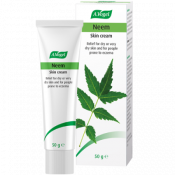Our customers love us!
We are proud of the products we offer and the high standard of customer service we deliver. Our customers love us so much they give us a customer rating of 4.8 out of 5!
It’s commonly assumed that giving up milk will improve eczema but only 2% of infants have a milk allergy that is associated with eczema. In this article, I look at whether giving up milk will help eczema and which diet is recommended to improve the skin and reduce inflammation.
Only 2% of infants have a confirmed milk allergy that is linked to eczema. There’s no clear scientific evidence proving that giving up milk will improve symptoms in the rest of the population, even in those that are lactose intolerant. What may help is the anti-inflammatory Mediterranean diet.
Milk allergy is associated with eczema, however it's important to note that this is not the same as saying that milk is bad for eczema. Let me explain...
Cow's milk contains two substances: the protein casein, and a natural sugar called lactose.
A severe casein allergy is relatively rare and is estimated to affect about 2% of infants. 69% of people should grow out of the allergy by the time they are age 10(1). Milk casein allergy is linked with eczema because often people will have both a food allergy and eczema. The symptoms of a food allergy can be serious - big hives and breathing difficulties that appear immediately after eating. Alternatively, it can be a slower reaction appearing some hours after exposure, with symptoms such as reflux, colic, constipation and eczema.
A diagnosed allergic association with eczema is branded as 'atopic eczema' or 'atopic dermatitis'. Confusingly, the term atopic dermatitis is used pretty randomly even when there is not a confirmed diagnosis of allergy-related eczema.
| Interesting fact: Milk protein is used in all sorts of manufacturing and can be hidden in things like wine and even condoms! |
40% of children with eczema do not have a specific food allergy; ergo, their skin condition will be called eczema rather than 'atopic' and is more likely to be caused by an inherited weakness in skin barrier function or as the effect of the environment.
| An allergy is when the body's own immune system identifies something non-threatening as 'quite scary actually'. It identifies antigens (proteins) present in milk, pollen, nut (whatever) and then produces antibodies to kill the invader. Ergo, whenever a person with allergies is exposed to said allergen, the immune system produces this giant and inappropriate reaction and all sorts of swelling and inflammation. Allergies can be present very early in life but can develop at any age. |
Lactose intolerance (or malabsorption) is different from an allergy. It affects the body's ability to digest lactose, a natural sugar in milk. Symptoms start usually about half an hour after ingesting milk products and include all sorts of IBS-like and fermentation-related upsets such as wind, bloating or diarrhoea.
This type of food intolerance has not been shown to have a direct effect on eczema. It affects 8% of the UK population and 4% of the Irish(2). It's more prevalent in people with Asian and Afro-Caribbean descendants, who may not produce enough of an enzyme called lactase responsible for breaking down lactose.
If a confirmed milk allergy is present, removing it from the diet will help control eczema symptoms.
Otherwise, there doesn't appear to be much scientific evidence that eliminating milk from the diet will help eczema. However, nutritionists argue that a chronically upset digestive system due to lactose malabsorption or other food intolerances can stress the body and lead to inflammation and eczema flare-ups. Poor digestion of food may also negatively affect the population of good bacteria in the gut, and this may aggravate skin conditions too. You can read more about eczema and its association with gut health here.
Many health care providers recommend the Mediterranean Diet because it has been shown to reduce inflammation and support the immune system by promoting a healthy digestive microflora. Both measures could be beneficial for strengthening the skin barrier function and therefore eczema. There is also some evidence to show that supplementing with probiotics may be beneficial for eczema(3).
The Mediterranean diet is based on simple principles - lean, clean protein and brightly coloured vegetables as well as good oily food such as nuts, flax seed and fish like salmon. If you can shove in lots of these lovely things it may also leave less room for any bad eating habits that may be aggravating eczema (alcohol, sweeties and takeaways etc). The A.Vogel website has lots of easy (and tasty) recipes link to keep you feeling motivated.
With eczema it's important to nourish the skin from the outside too. This ensures that it is protected from irritating environmental hazards and from drying out.

"Brilliant for itchy irritated skin"

We are proud of the products we offer and the high standard of customer service we deliver. Our customers love us so much they give us a customer rating of 4.8 out of 5!
Our Herbamare combines herbs and vegetables with a little sea salt to create a delicious, healthy seasoning for any dish!
Join Hetty and Martin in the A.Vogel gardens to improve your flexibility.
Carbohydrates have a bad reputation, but eating the right kinds can actually be great for weight management!
Alfred Vogel's guide to leading a healthy and happy life
Get new recipes in your inbox every week. Sign up now
No Comments
The comment function is temporarily unavailable.
41912